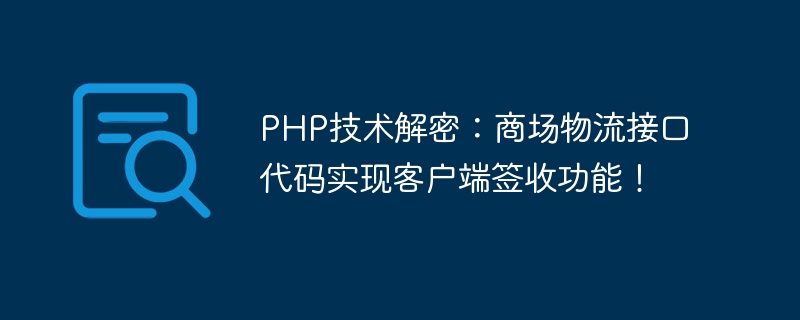Home >Backend Development >PHP Tutorial >PHP technology decryption: The mall logistics interface code realizes the client signing function!
PHP technology decryption: The mall logistics interface code realizes the client signing function!
- 王林Original
- 2023-09-12 10:33:32904browse

PHP technology decryption: The mall logistics interface code realizes the client signing function!
With the rapid development of e-commerce, the logistics industry has also ushered in vigorous development. How to handle logistics interfaces quickly and efficiently has become a problem that e-commerce companies are scrambling to study. This article will introduce a way to use PHP technology to implement the client signing function of the shopping mall logistics interface code.
First of all, we need to understand the basic principles of the shopping mall logistics interface. The logistics interface refers to the interface for information exchange between the mall website and the logistics company. Through the logistics interface, the mall website can obtain the latest logistics information, including express delivery order number, delivery status, receipt status, etc. The client signing function refers to the function that users on the mall website can view and sign for the logistics information of the order through the client.
To implement the client signing function, we need to use PHP technology to write the corresponding code. First, we need to set up a web server to run PHP code. It can be built using commonly used web server software such as Apache and Nginx.
Next, we need to obtain the API of the logistics interface. Different logistics companies may provide different API interfaces, and you need to choose the corresponding interface according to the actual situation. Usually, we can obtain the usage documentation and related development information of the API interface by connecting with the logistics company.
Generally speaking, the use of logistics interfaces requires identity authentication. We need to apply for a developer account from the logistics company and obtain the API key through the account to verify it in the code.
Then, we can write PHP code to implement the client signing function. First, we need to connect to the logistics interface, send requests and obtain data. By parsing the data returned by the API, we can obtain the courier number, delivery status and other information. We can then display this information on the user interface.
At the same time, we also need to add a sign-in button on the user interface. When the user clicks the sign button, we need to send a sign request to the logistics interface. When sending a request, we need to provide corresponding parameters, such as order number, express delivery number, etc. By parsing the data returned by the API, we can determine whether the signature is successful and display relevant information on the user interface.
In actual development, we can also optimize the code according to needs. For example, asynchronous requests can be used to improve performance and enable real-time updates signed by the client. Caching technology can be used to reduce the frequency of access to the logistics interface and improve system performance and stability.
To sum up, PHP technology provides us with effective tools and methods to implement the client signing function of the shopping mall logistics interface code. Through reasonable code writing and optimization, we can achieve fast and efficient client signing function, improving user experience and e-commerce operation efficiency. I believe that with the continuous development of technology, the logistics industry will usher in more and better solutions.
The above is the detailed content of PHP technology decryption: The mall logistics interface code realizes the client signing function!. For more information, please follow other related articles on the PHP Chinese website!
Related articles
See more- Recommendation of the 10 best PHP development tools in 2023
- Facing the huge losses of PHP Chinese website, should I pay for my feelings? (Brother Pig)
- PHP running environment configuration under windows
- How to use foreach in PHP
- Use PHP to develop a shopping mall logistics interface: code to control the product delivery process!

